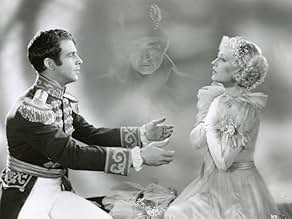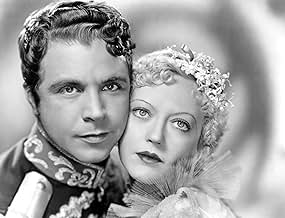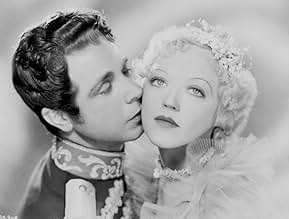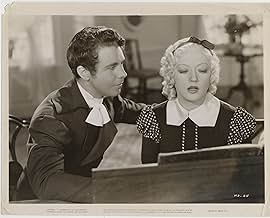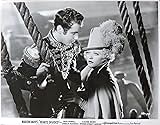Füge eine Handlung in deiner Sprache hinzuNapoleon needs money to fight his wars in Europe so he wants 20 million dollars for the Louisiana Territory in the United States. To help the negotiations, he sends his brother, Jerome, to t... Alles lesenNapoleon needs money to fight his wars in Europe so he wants 20 million dollars for the Louisiana Territory in the United States. To help the negotiations, he sends his brother, Jerome, to the U.S. on a goodwill tour. At a Maryland Horse Track, Jerome shows up without notice and ... Alles lesenNapoleon needs money to fight his wars in Europe so he wants 20 million dollars for the Louisiana Territory in the United States. To help the negotiations, he sends his brother, Jerome, to the U.S. on a goodwill tour. At a Maryland Horse Track, Jerome shows up without notice and soon wins an afternoon tour with Betsy. He falls for her, but she will have little to do w... Alles lesen
- Regie
- Drehbuch
- Hauptbesetzung
- Henry
- (as Charlie Ruggles)
- Pippin
- (as Phillip Hurlic)
- Gabriel
- (Nicht genannt)
- Robert Livingston
- (Nicht genannt)
Empfohlene Bewertungen
From the start, I must admit that for me, at least, the film has a major strike against it. The likable Dick Powell co-stars in the film, however, since it was made during his "singing star" period, he spends lots and lots of time singing...and I don't particularly like it in the film. In fact, Powell himself hated all the singing roles he had through the 1930s and loved when they gave him films where he could concentrate on his acting--which was usually very nice. Why they would have Davies starring opposite a singer like Powell is beyond me--it does not play to her strengths--she was certainly NOT a singer but was more adept at light comedy. Now had the female lead been Jeanette MacDonald, this might have worked better! As for the rest of the cast, Davies got some nice support. Likable and very capable supporting actors like Henry Stephenson, Arthur Treacher (oddly, he's NOT starring as a butler here), Claude Rains, Charlie Ruggles and Edward Everett Horton are on hand--adding a lot of nice color to the film.
Oh, and speaking of color, some might feel rightly put off by the slaves in the film. They are pretty happy folks and the white masters are pretty good to them (especially the sweet Davies) and this is pretty tacky. This "happy slave" stereotype is perhaps worse than just ignoring the plight of blacks during the era in which the film was set.
The setting for the film, incidentally, is both in France and the US during the early years at the beginning of the 19th century. Napoleon (Rains) need funds for his many wars and is trying to sell the Louisiana Territory to the Americans. During these negotiations, a French agent and brother to Napoleon (Powell) is in the States--though you really aren't sure why. In his capacity as an agent, he wants to remain incognito, so he poses as a French language teacher and is engaged by Davies' family to tutor her. Her family is quite wealthy--and happen to hate Napoleon.
Naturally, like romances of the day, you know that eventually the two will be in love. However, where it went from there was hard to predict because, amazingly, this weird and seemingly silly plot is actually based on the real life romance between Elizabeth Patterson and Jerome Bonaparte! And, oddly for a romance of the 1930s, it ends most tragically--not sweetly like the audience probably hoped.
So how true is this film? Well, in many ways it's surprisingly close--at least in the first 2/3 of the film. However, the scene with Napoleon convincing Elizabeth to give him up never occurred--as in real life, she tried and tried in vain to keep her Jerome--even though history shows us that he wasn't worth this loyalty (he was a real chuckle-head). I also cringed a bit with the scene between Napoleon and his mommy--it just came off as false and a bit silly. But worst of all was the tacked on happy ending--that never happened in real life!! In reality, Jerome left his pregnant wife and married a German princess!! Oops! This bit of historical liberty is simply unforgivable. How so many people could give this amiable but patently false film a 10 is beyond me.
Set during the early 1800s, Napoleon Bonaparte (Claude Rains) assigns his younger brother, Jerome (Dick Powell) to America as representative for the negotiation for the sale of the state of Louisiana for $20,000. Taking up residence at the Baltimore Inn, Jerome, on his resented "good will tour," comes to the horse races where he becomes enamored by the presence of Betsy Patterson (Marion Davies), a society girl. At first Betsy resents this young man until he croons to her, later assuming the role in the guise as her singing tutor. His identity is finally realized at a reception of the Patterson home where Jerome publicly proposes to Betsy, regardless of his telegram from Napoleon, now Emperor of France, ordering his return to marry Princess Catherine of Wurtemberg or face disgrace as a traitor.
Often categorized as a musical, songs for this production are limited to some degree. While HEARTS DIVIDED might have selected popular songs from the colonial era, an original score by Harry Warren and Al Dubin was used instead. New songs include: "My Kingdom for a Kiss" (sung in French by Dick Powell); "Nobody Knows the Trouble I Have Seen" (traditional Negro folk song performed briefly by The Hall Johnson Choir); "My Kingdon For a Kiss" (reprized in French and English by Powell); "Two Lovely Heart's Divided." and "My Kingdom For a Kiss." "My Kingdom for a Kiss," a nice tune, is underscored numerous times, used effectively during scenes involving Davies and Powell.
Although Marion Davies is far better suited for comedies than dramas, she makes a lovely presence in this costumer. It's seems unlikely, however, finding resident crooner Dick Powell in early American setting, even more unlikely having him playing a Frenchman. While he does sing a song entirely in French, Powell, along with Rains, make no attempt speaking with French accents. Overall, the Davies and Powell combination, which began with the hit and miss comedy of PAGE MISS GLORY (1935), would come to its conclusion with this historical account and based on fact love story.
Edward Everett Horton, Charles Ruggles and Arthur Treacher provide amusing moments with their comical support as members of the United States senate and would-be suitors of Glorious Betsy. Straightforward performances go to Henry Stephenson as Betsy's father; Clara Blandick as Betsy's spinster aunt; and Beulah Bondi with only one scene as Bonaparte's mother. Hobart Cavanaugh, Walter Kingsford, Etienne Girardot and Philip Hurlic can be seen in smaller roles.
Regardless of his British heritage, Claude Rains physically makes a fine Napoleon, a role enacted in more detail by Charles Boyer in CONQUEST (MGM, 1937), earning the born Frenchman an Academy Award nomination. No such honor for Rains here, but although his scenes are somewhat limited, he makes every moment count, especially later in the story where, in the manner of a mother coming between her son and future bride, asking Betsy, for the good of France, to give up his brother, but it is Davies as Betsy, under Borzage's sensitive direction, who nearly overcomes Rains performance in how she handles this situation.
Reportedly previewed at 88 minutes, circulating prints for available at 76 minutes, making one hope for the discovery of the missing footage. A rarely seen item from the era of Warner Brothers musicals or costume dramas, HEARTS DIVIDED can be seen periodically on Turner Classic Movies. (***)
This film is typical of Marion Davies for it not only has the ability to show off benefactor William Randolph Hearst's many historical items and costumes, she is able to show her natural spunk and joviality. Powell responds in kind with his lighthearted cracks and beautiful smile. The two work well together and shine in their own rights.
There are also a few catchy songs sung by the gorgeous tenor voice of Dick Powell.
This good-natured romance film has been rather harshly criticized as being bad history, which it is, instead of being appreciated for its simple aim to provide some escapist amusement in the form of a lavish movie starring Marion Davies. In this it succeeds. William Randolph Hearst, Davies' powerful lover, saw to that, and what Hearst wanted he generally got. Although the plot is exceedingly silly at times, the film is still a pleasant entertainment.
At 39, Davies was too old for the part (and older than her costar by seven years), but Hearst liked seeing her in the crinoline & lace roles, and she had little control of the matter. However, as was her custom, Marion charms the viewer with her buoyant spirits, willingness to please and genuine acting skills. She's more than able to hold her own with a talented supporting cast and appears quite happy to be in the arms of young Dick Powell. For his part, Powell needs do little more than exude boyish charm and sing a few times to cover his acting requirements quite nicely.
As Napoleon, the great Claude Rains steals every scene he's in by very quietly underplaying his acting and only hinting at the tremendous power his character wields. Fascinating to watch even under heavy makeup, Rains makes a quality contribution to the film.
The movie's humor is largely handled by a trio of excellent character actors. Droll Arthur Treacher, suspicious Edward Everett Horton & grumpy Charles Ruggles play Marion's erstwhile suitors. Constantly trying to upstage each other, their dialogue provides plenty of chuckles.
Even in minor casting the film excels. Dignified Henry Stephenson and sharp-tongued Clara Blandick play Marion's father and aunt. Walter Kingsford & diminutive Etienne Girardot play the French officials assigned to keep an eye on Mr. Powell. Halliwell Hobbes lends gravity to his small role as Napoleon's Second Consul. Beulah Bondi brightens her single scene as the Bonaparte boys' kindhearted mother. And the magnificent Hall Johnson Choir appears to lift its voice in song for a few moments.
Time has not dealt kindly with Marion Davies. Almost forgotten today, when remembered at all it is usually as a sort of footnote to history or object of scandal. Her life certainly was colorful, and as chatelaine of America's most amazing private estate she did circulate amidst powerful circles. But to remember her as the bimbo blonde mistress of the country's mightiest media baron is patently unfair.
While much of the blame can go to Orson Welles' spoof of Davies in CITIZEN KANE (which he was to admit he regretted towards the end of his life) it must be stated emphatically that Marion was not a no-talent actress with few friends & even fewer brains, whose career was destroyed by her stammer leaving her to spend lonely years in great, hulking empty castles.
In reality, Davies was a bright, vivacious lady who charmed & captivated such diverse guests as George Bernard Shaw & Winston Churchill throughout her 33-year liaison with Hearst. Adored by her friends and a fierce cadre of fans, Davies was renowned for her tireless generosity and charitable good works. Her speech impediment never affected her screen acting and her undeniable talent was evident to any who were willing to assess her performances honesty and look past the scandal.
Davies had to have been embarrassed by the Hearst empire's relentless pushing of her career. She knew this left her open to ridicule & mockery, doubtless contributing to her scarcely concealed alcoholism. But she eventually relinquished her film pursuits in order to care for the aging Hearst, and after his death in 1951 she showed herself to be an astute businesswoman during the remaining ten years of her life.
It is only now, with the passage of much time & the restoration of her old movies, that it is becoming easier to acknowledge the contributions & cinematic expertise of Marion Davies.
****************************
Jérôme Bonaparte (1784-1860) was only 16 when he entered the service of Napoleon as a member of the Consular Guard. After being wounded in a duel he transferred to the French Navy. Leaving his ship in the West Indies, he entered the United States, (Jérôme was not involved in the sale of the Louisiana Purchase to America) where he fell in love with Elizabeth Patterson of Baltimore, Maryland. They were married on Christmas Eve, 1803. After returning to Europe with his wife in 1805, it was discovered that Napoleon had annulled the marriage and forbade Elizabeth to enter any of his domains. This decision was absolutely determinate. Elizabeth was returned to America and Jérôme was married to Princess Catherine of Württemberg and subsequently proclaimed King of Westphalia in 1807, which included a wide territory east of the Rhine in addition to the former province of Westphalia. He abdicated in 1813 when Napoleon's powers began to decline, but he continued to serve as a loyal officer fighting for his brother until the Battle of Waterloo brought total defeat in 1815. Jérôme then retired into self-exile and did not return to France until 1847, when he entered the service of his nephew Napoleon III, the son of his brother Louis. Jérôme would eventually serve as Governor of the Invalides, Marshal of France & President of the Senate.
WUSSTEST DU SCHON:
- WissenswertesThere is an outtake of actor Claude Rains, dressed as Napoleon, crying out, "God damn!" taken from this film.
- Zitate
Napoleon Bonaparte: Every time you open your mouth the British Navy comes sailing out.
- VerbindungenReferenced in Svengoolie: The Invisible Man (2008)
- SoundtracksLa Marseillaise
(1792) (uncredited)
Written by Claude Joseph Rouget de Lisle
Played and sung early in the picture
Top-Auswahl
Details
- Erscheinungsdatum
- Herkunftsland
- Sprachen
- Auch bekannt als
- Zora slave
- Drehorte
- Produktionsfirmen
- Weitere beteiligte Unternehmen bei IMDbPro anzeigen
- Laufzeit1 Stunde 27 Minuten
- Farbe
- Sound-Mix
- Seitenverhältnis
- 1.37 : 1
Zu dieser Seite beitragen


